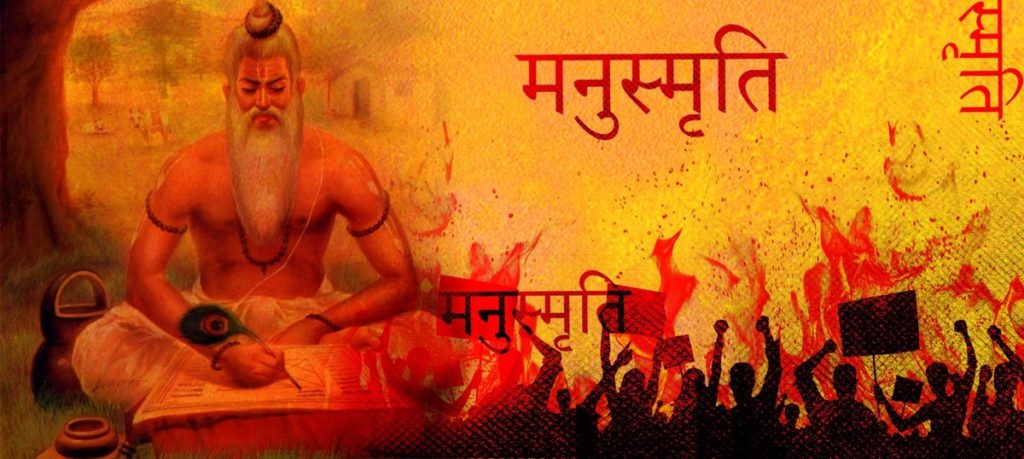
Some Excerpts from Manusmriti – Law Book of Hindus
What Manusmriti says? Read the casteist and discriminating quotes and verses from the Manusmriti, law book of Hindus that they follow religiously.
I – 91. One occupation only the lord prescribed to the shudra to serve meekly even these other three castes.
I – 93. As the Brahmana sprang from (Prajapati’s i.e. God’s ) mouth, as he was first-born, and as he possesses the veda, he is by right the lord of this whole creation.
II – 31. Let (the first part of ) a brahmin’s (denote) something auspicious, a kshatriya’s name be connected with power and a vaishya’s with wealth, but a Shudra’s (express something) contemptible.
II-32. (The second part of) a brahmin’s (name) shall be (a word) implying happiness, of a kshatriya’s (word) implying protection, of a Vaishya’s (a term) expressive of thriving, and of a shudra’s (an expression) denoting service.
II – 100. Whatever exists in the world is the property of the Brahmana; on account of the excellence of his origin the Brahmana is indeed, entitled to it all.
Regarding the study of Vedas by shudras:
IV – 99. He (the twice born) must never read (the vedas) —– in the presence of the shudras.
VIII – 37. When a learned Brahmin has found treasure, deposited in former (times), he may take even the whole (of it); for he is the master of everything.
VIII – 270. A shudra who insults a twice born man with gross invective, shall have his tongue cut out; for he is of low origin.
VIII – 271. If he mentions names and castes of the (twice born) with contumely, an iron nail, ten fingers, shall be thrust red hot into his mouth.
VIII – 410. King should order each man of the mercantile class to practice trade, or money lending or agriculture and attendance on cattle; and each man of the servile class to act in the service of the twice born.
Read also – Casteist Verses from Manusmriti – Law Book of Hindus
About the status of women:
IX – 3 . Her father protects (her) in childhood, her husband protects (her) in youth and her sons protect (her) in old age; a woman is never fit for independence.
IX – 18. Women have no business with the text of the veda.
IX – 189. The property of a Brahmana must never be taken by the king, that is a settled rule; but (the property of men) of other castes the king may take on failure of all (heirs).
IX – 317. A Brahmin, whether learned or ignorant, is a powerful divinity.
X – 121. If a shudra (unable to subsist by serving brahmanas) seeks a livelihood, he may serve kshatriyas, or he may also seek to maintain himself by attending on a wealthy viashya.
X – 122. But let a shudra serve brahmans, either for the sake of heaven or with a view to both this life and the text, for he who is called the servant of a Brahmana thereby gains all his ends.
X – 123. The service of the Brahmana alone is declared to be an excellent occupation for a shudra; for whatever else besides this he may perform will bear no fruit.
Dealing with the question of wages to the shudras:
X – 124. They must allot to him (shudra) out of their own family property a suitable maintenance, after considering his ability, his industry and the number of those whom he is bound to support.
X – 125. The remnants of their food must be given to him, as well as their old clothes, the refuge of their grain and their old household furniture.
X – 129. No collection of wealth must be made by a shudra even though he be able to do it; for a shudra who has acquired wealth gives pain to Brahmana.
XI – 6. One should give, according to one’s ability, wealth to Brahmanas learned in the veda and living alone; (thus) one obtains after death heavenly bliss.
XI – 261-62. A Brahmana who has killed even the peoples of the three worlds, is completely freed from all sins on reciting three times the Rig, Yajur or Sama- Veda with the Upanishad.
Thus in Hinduism, there is no choice of avocation. There is no economic independence and there is no economic security. Economically, speaking of a shudra is a precarious thing.
Successors of Manu made the disability of the shudra in the matter of study of veda into an offence involving dire penalties as:
XII. 4. If the shudra intentionally listens for committing to memory the veda, then his ears should be filled with (molten) lead and lac; if he utters the veda, then his tongue should be cut off; if he has mastered the veda his body should be cut to pieces.



+ There are no comments
Add yours